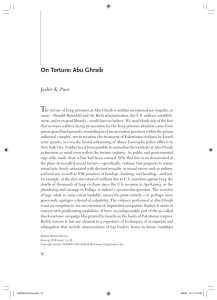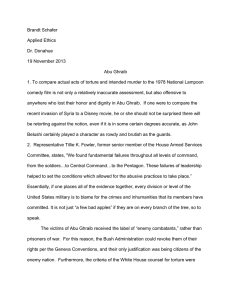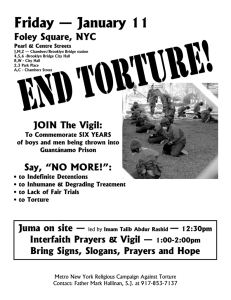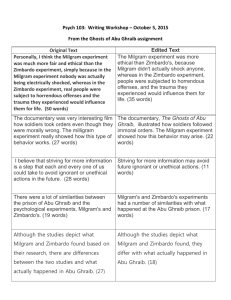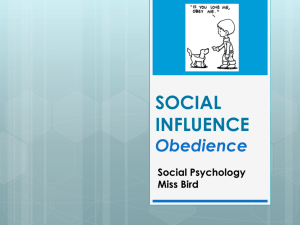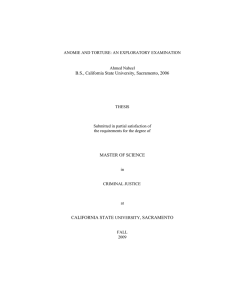Document 12911136
advertisement
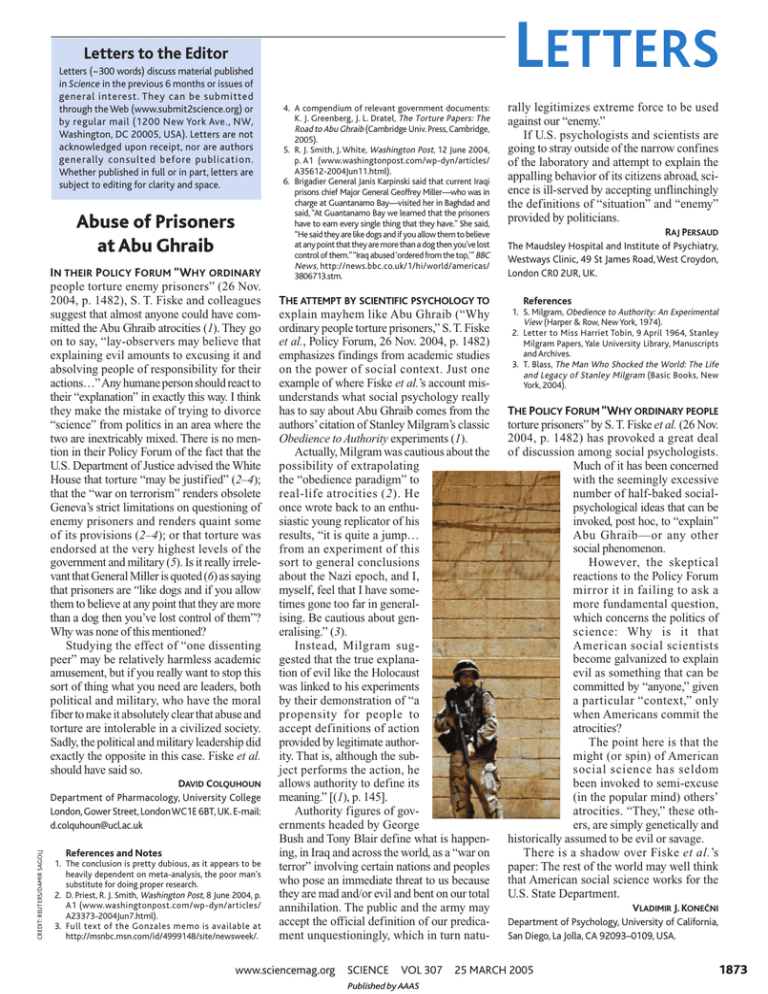
LETTERS Letters to the Editor Letters (~300 words) discuss material published in Science in the previous 6 months or issues of general interest. They can be submitted through the Web (www.submit2science.org) or by regular mail (1200 New York Ave., NW, Washington, DC 20005, USA). Letters are not acknowledged upon receipt, nor are authors generally consulted before publication. Whether published in full or in part, letters are subject to editing for clarity and space. Abuse of Prisoners at Abu Ghraib IN THEIR POLICY FORUM “WHY ORDINARY people torture enemy prisoners” (26 Nov. 2004, p. 1482), S. T. Fiske and colleagues suggest that almost anyone could have committed the Abu Ghraib atrocities (1). They go on to say, “lay-observers may believe that explaining evil amounts to excusing it and absolving people of responsibility for their actions…” Any humane person should react to their “explanation” in exactly this way. I think they make the mistake of trying to divorce “science” from politics in an area where the two are inextricably mixed. There is no mention in their Policy Forum of the fact that the U.S. Department of Justice advised the White House that torture “may be justified” (2–4); that the “war on terrorism” renders obsolete Geneva’s strict limitations on questioning of enemy prisoners and renders quaint some of its provisions (2–4); or that torture was endorsed at the very highest levels of the government and military (5). Is it really irrelevant that General Miller is quoted (6) as saying that prisoners are “like dogs and if you allow them to believe at any point that they are more than a dog then you’ve lost control of them”? Why was none of this mentioned? Studying the effect of “one dissenting peer” may be relatively harmless academic amusement, but if you really want to stop this sort of thing what you need are leaders, both political and military, who have the moral fiber to make it absolutely clear that abuse and torture are intolerable in a civilized society. Sadly, the political and military leadership did exactly the opposite in this case. Fiske et al. should have said so. CREDIT: REUTERS/DAMIR SAGOLJ DAVID COLQUHOUN Department of Pharmacology, University College London, Gower Street, London WC1E 6BT, UK. E-mail: d.colquhoun@ucl.ac.uk References and Notes 1. The conclusion is pretty dubious, as it appears to be heavily dependent on meta-analysis, the poor man’s substitute for doing proper research. 2. D. Priest, R. J. Smith, Washington Post, 8 June 2004, p. A1 (www.washingtonpost.com/wp-dyn/articles/ A23373-2004Jun7.html). 3. Full text of the Gonzales memo is available at http://msnbc.msn.com/id/4999148/site/newsweek/. 4. A compendium of relevant government documents: K. J. Greenberg, J. L. Dratel, The Torture Papers: The Road to Abu Ghraib (Cambridge Univ. Press, Cambridge, 2005). 5. R. J. Smith, J. White, Washington Post, 12 June 2004, p. A1 (www.washingtonpost.com/wp-dyn/articles/ A35612-2004Jun11.html). 6. Brigadier General Janis Karpinski said that current Iraqi prisons chief Major General Geoffrey Miller—who was in charge at Guantanamo Bay—visited her in Baghdad and said, “At Guantanamo Bay we learned that the prisoners have to earn every single thing that they have.” She said, “He said they are like dogs and if you allow them to believe at any point that they are more than a dog then you’ve lost control of them.”“Iraq abused ‘ordered from the top,’” BBC News, http://news.bbc.co.uk/1/hi/world/americas/ 3806713.stm. THE ATTEMPT BY SCIENTIFIC PSYCHOLOGY TO explain mayhem like Abu Ghraib (“Why ordinary people torture prisoners,” S. T. Fiske et al., Policy Forum, 26 Nov. 2004, p. 1482) emphasizes findings from academic studies on the power of social context. Just one example of where Fiske et al.’s account misunderstands what social psychology really has to say about Abu Ghraib comes from the authors’ citation of Stanley Milgram’s classic Obedience to Authority experiments (1). Actually, Milgram was cautious about the possibility of extrapolating the “obedience paradigm” to real-life atrocities (2). He once wrote back to an enthusiastic young replicator of his results, “it is quite a jump… from an experiment of this sort to general conclusions about the Nazi epoch, and I, myself, feel that I have sometimes gone too far in generalising. Be cautious about generalising.” (3). Instead, Milgram suggested that the true explanation of evil like the Holocaust was linked to his experiments by their demonstration of “a propensity for people to accept definitions of action provided by legitimate authority. That is, although the subject performs the action, he allows authority to define its meaning.” [(1), p. 145]. Authority figures of governments headed by George Bush and Tony Blair define what is happening, in Iraq and across the world, as a “war on terror” involving certain nations and peoples who pose an immediate threat to us because they are mad and/or evil and bent on our total annihilation. The public and the army may accept the official definition of our predicament unquestioningly, which in turn natu- www.sciencemag.org SCIENCE VOL 307 Published by AAAS rally legitimizes extreme force to be used against our “enemy.” If U.S. psychologists and scientists are going to stray outside of the narrow confines of the laboratory and attempt to explain the appalling behavior of its citizens abroad, science is ill-served by accepting unflinchingly the definitions of “situation” and “enemy” provided by politicians. RAJ PERSAUD The Maudsley Hospital and Institute of Psychiatry, Westways Clinic, 49 St James Road, West Croydon, London CR0 2UR, UK. References 1. S. Milgram, Obedience to Authority: An Experimental View (Harper & Row, New York, 1974). 2. Letter to Miss Harriet Tobin, 9 April 1964, Stanley Milgram Papers, Yale University Library, Manuscripts and Archives. 3. T. Blass, The Man Who Shocked the World: The Life and Legacy of Stanley Milgram (Basic Books, New York, 2004). THE POLICY FORUM “WHY ORDINARY PEOPLE torture prisoners” by S. T. Fiske et al. (26 Nov. 2004, p. 1482) has provoked a great deal of discussion among social psychologists. Much of it has been concerned with the seemingly excessive number of half-baked socialpsychological ideas that can be invoked, post hoc, to “explain” Abu Ghraib—or any other social phenomenon. However, the skeptical reactions to the Policy Forum mirror it in failing to ask a more fundamental question, which concerns the politics of science: Why is it that American social scientists become galvanized to explain evil as something that can be committed by “anyone,” given a particular “context,” only when Americans commit the atrocities? The point here is that the might (or spin) of American social science has seldom been invoked to semi-excuse (in the popular mind) others’ atrocities. “They,” these others, are simply genetically and historically assumed to be evil or savage. There is a shadow over Fiske et al.’s paper: The rest of the world may well think that American social science works for the U.S. State Department. VLADIMIR J. KONEC̆NI Department of Psychology, University of California, San Diego, La Jolla, CA 92093–0109, USA. 25 MARCH 2005 1873 LETTERS IN THEIR POLICY FORUM “WHY ORDINARY people torture enemy prisoners” (26 Nov. 2004, p. 1482), S. T. Fiske et al. point out that abhorrent actions such as those that occurred at Abu Ghraib can be prevented by “even one dissenting peer.” This brings to mind a statement made by Elie Wiesel in his 1986 Nobel Peace Prize acceptance speech: “I swore never to be silent whenever and wherever human beings endure suffering and humiliation. We must take sides. Neutrality helps the oppressor, never the victim. Silence encourages the tormentor, never the tormented. Sometimes we must interfere. When human lives are in danger, when human dignity is in jeopardy, national borders and sensitivities become ir relevant.” Would that we all could remember this and act accordingly, when under the prevalent influence of conforming pressures. DAVID C. MUSCH Departments of Ophthalmology and Visual Sciences, and Epidemiology, University of Michigan, Kellogg Eye Center, 1000 Wall Street,Ann Arbor, MI 48105, USA. Response OUR CRITICS RAISE TWO PRIMARY OBJECTIONS to our Policy Forum: the nature of the evidence and the scope of the conclusions. 1874 Konec̆ni expresses skepticism for which he presents no evidence: He implies that our summary of peer-reviewed, published metaanalyses by respected scholars represents a fringe perspective, claiming that our article “provoked a great deal of discussion among social psychologists”; in fact, there has been little discussion on any social psychology list-serve, e-mail, or newsletter to that effect as far as we know. Konec̆ni suggests that the principles invoked in our article (aggression under stress, prejudice against outgroups, conformity to peers, obedience to authorities, and step-by-step social influence) are “half-baked”: These principles are supported not only by the meta-analyses across dozens of studies, but each also is widely accepted as a fundamental scientific principle. Colquhoun objects that meta-analytic evidence is the “poor man’s substitute for doing proper research.” I would challenge him to do that research, because social scientists have not been permitted to examine the evidence and interview the perpetrators and victims. In the absence of new data, the cumulative evidence of research indeed helps to account for the events. Our purpose was not to conduct fresh research but to publicize a reliable database that might 25 MARCH 2005 VOL 307 SCIENCE Published by AAAS have averted these events, had the right people cared to look. It might still help to avert future such actions by Americans and by others. Persaud protests extrapolation from laboratory studies to real-life atrocities. But would he have us ignore the decades of replications across cultures and settings— both laboratory and field—that indicate the power of stress, prejudice, peers, authorities, and commitment? Konec̆ni demonizes our inferred politics and urges us to identify other torturers around the world. Colquhoun urges us to take stronger, more explicit political stands. In contrast, Persaud chastises us for “stray[ing] outside the narrow confines of the laboratory.” We think that the implications of the evidence are self-evident, but our brief as scientists is to report the evidence. We believe that the evidence speaks for itself, and we think that science is more credible when it acts as an honest broker, presenting the available, reliable data but refraining from arguing for a particular political solution. We reiterate our already published stand: The evidence indicates that the individuals are responsible, yes, because sometimes (rarely) they can and do resist social www.sciencemag.org LETTERS pressures. But also responsible are their peers and superiors up the chain of command, who determine the powerful social context that encourages atrocities. These principles help explain an event of special significance to Americans because the perpetrators are Americans. Clearly, it applies beyond the American context, as recent events distressingly indicate. Indeed, we concur with Musch. SUSAN T. FISKE, LASANA T. HARRIS, AMY J. C. CUDDY Department of Psychology, Princeton University, Princeton, NJ 08544–1010, USA. Reinventing the Wheel in Ecology Research? W E ARE PLEASED WITH M. S OLAN ET AL .’ S findings that “species extinction is generally expected to reduce the depth of bioturbated sediments” (“Extinction and ecosystem function in the marine benthos,” Reports, 12 Nov. 2004, p. 1177) and support their conclusion that “Such changes might be expected to alter the fluxes of energy and matter that are vital to the global persistence of marine communities,” signif icantly altering ecosystem function. At the University of Texas Marine Science Institute, we conducted a 5-year study of benthic community structure and function in South Texas Gulf of Mexico coastal waters. Our findings documented the effects of larger fauna (e.g., enteropneusts and ophiuroids) on benthic community structure, sediment metabolism, and nutrient regeneration (1). Changes in biodiversity, depth of the oxygenated sediments, and sediment nutrient release rates were influenced by the presence or absence of a “key” benthic macroinfaunal species (i.e., Schizocardium sp.). Our studies of two decades ago, from natural field observations aided by the extinction of a “key” bioturbator, support the conclusions of the Solan modeling strategy (2–6). In his related Perspective “How extinction patterns affect ecosystems” (12 Nov. 2004, p. 1141), D. Raffaelli surmises that ecologists are challenged in advising policymakers about the effects of benthic changes on ecosystems throughout a food web. Solan et al.’s statement of the need to “protect coastal environments from human activities that disrupt the ecological functions species perform” echoes what we (as well as many others) stated 20 years ago. Why do we keep repeating aspects of ecological research Published by AAAS instead of building on historical accounts? If we were better at telling the evolving story instead of simply repeating pronouncements over decades, we would not face such a “challenge” in convincing policy-makers to develop a more comprehensive, adaptive approach to marine ecosystem management. R.WARREN FLINT1 AND RICHARD D. KALKE2 E’s Unlimited (http://www.eeeee.net), 28 Randolph Place, NW, Washington, DC 20001, USA. E-mail: rwflint@eeeee.net. 2University of Texas, Marine Science Institute, Port Aransas,TX 78373, USA. 1 Five References 1. R. W. Flint, R. D. Kalke, Mar. Ecol. Prog. Ser. 31, 23 (1986). 2. R. W. Flint, D. Kamykowski, Estuar. Coastal Shelf Sci. 18, 221 (1984). 3. R. W. Flint, Mar. Chem. 16, 351 (1985). 4. R. W. Flint et al., Estuaries 9 (no. 4A), 284 (1986). 5. R.W. Flint, R. D. Kalke, Contrib. Mar. Sci. 28, 33 (1985). 6. R.W. Flint, R. D. Kalke, Estuar. Coastal Shelf Sci. 22, 657 (1986). Response FLINT AND KALKE SUGGEST THAT THE ISSUES that Solan et al. and Raffaelli discuss have been addressed before. Ecologists have historically focused on biodiversity as a response variable driven by, or correlated with, ecological processes. When studies have explored the effect of organisms on
